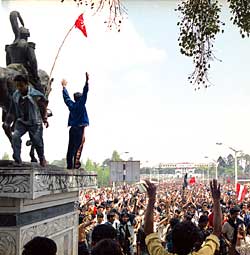 The US State Department released its annual country reports on human rights practices last week. Few students of international politics still believe that the US changes its polices towards particular countries on the basis of their state of democracy and human rights. It is the national interest that reigns supreme and we don't have to go very far for examples.
The US State Department released its annual country reports on human rights practices last week. Few students of international politics still believe that the US changes its polices towards particular countries on the basis of their state of democracy and human rights. It is the national interest that reigns supreme and we don't have to go very far for examples. In the 1980s, the fundamentalist Islamic government of Gen Zia-ul-Haq was the most trusted and reliable friend of America in its campaign against the Soviets in Afghanistan. In 1998, sanctions were imposed on India and Pakistan following their nuclear tests. In the aftermath of the September 11 attacks in the US, President Bush declared sanctions were no longer in America's "national security interest". The US has often over-ridden democracy and human rights in pursuit of its national interest.
Having said that, democracy and human rights do feature prominently in US foreign policy. Since the idea of "democratic peace" (democracies don't fight each other) was promoted in the early 1980s, the successive American governments have given due prominence to democratisation and human rights. Only when the US administration feels that the American interests are served better through dictatorial regimes, as in the case of Saudi Arabia or Musharraf's Pakistan, does it speak duplicitous language. Or when it believes that the promotion of democracy and human rights serves the US national interest better in the long run.
In its Nepal report, the State Department blames the army and the Maoists for dismal human rights records. However, the report does not blame anyone for the most fundamental violation of human and democratic rights of the Nepalis as a nation: the right to choose their government, which has been taken away by the king.
Does this mean that the king's action has better served the American interest, hence the silence? We obviously can't expect the Americans to promote rights at the expense of their national interest. But how does the king's undemocratic regime do America any good? Washington must remember how the promotion of Islamic fundamentalism in Pakistan in the 1980s to fight the Soviets resulted in the emergence of the Taliban 20 years later. The support to Saddam Hussain during the Iraq-Iran conflict emboldened him to start subsequent adventures.
The Americans, and the West in general, have been visibly lenient about the royal takeover of executive powers. They don't seem to realise that the king's continuing rule has only helped extremists of the right and the left of the political spectrum. They should realise that unless constitutional institutions are strengthened, there is a possibility of human rights violations getting worse.
This is not, in any way, a call for coercive intrusion into the state's affairs. However, let's be open enough to understand that there are certain universal values like human rights and democracy, the violation of which, call for international pressure to stop it. Such pressures should not be considered as a violation of sovereignty, the definition of which, has changed drastically in this era of globalisation.
It may, therefore, be time for greater international pressure on the king to restore the democratic institutions as a first step towards resolving the country's political crisis. The irrational arrogance of sovereignty and fear of being labelled anti-nationalist in supporting international pressure for protection of human rights and democracy will do no good to our nation.
The silence of the State Department report on the fundamental violation of human and democratic rights of the Nepalis should be deplored, but there should be no hesitation to say that if the US and other Western governments want Nepal to stop from sliding into a failed state, they should be more vocal in pressuring the king to rectify his mistakes. Actions have to be taken in time. History has plenty of examples that delays can have dangerous consequences.



